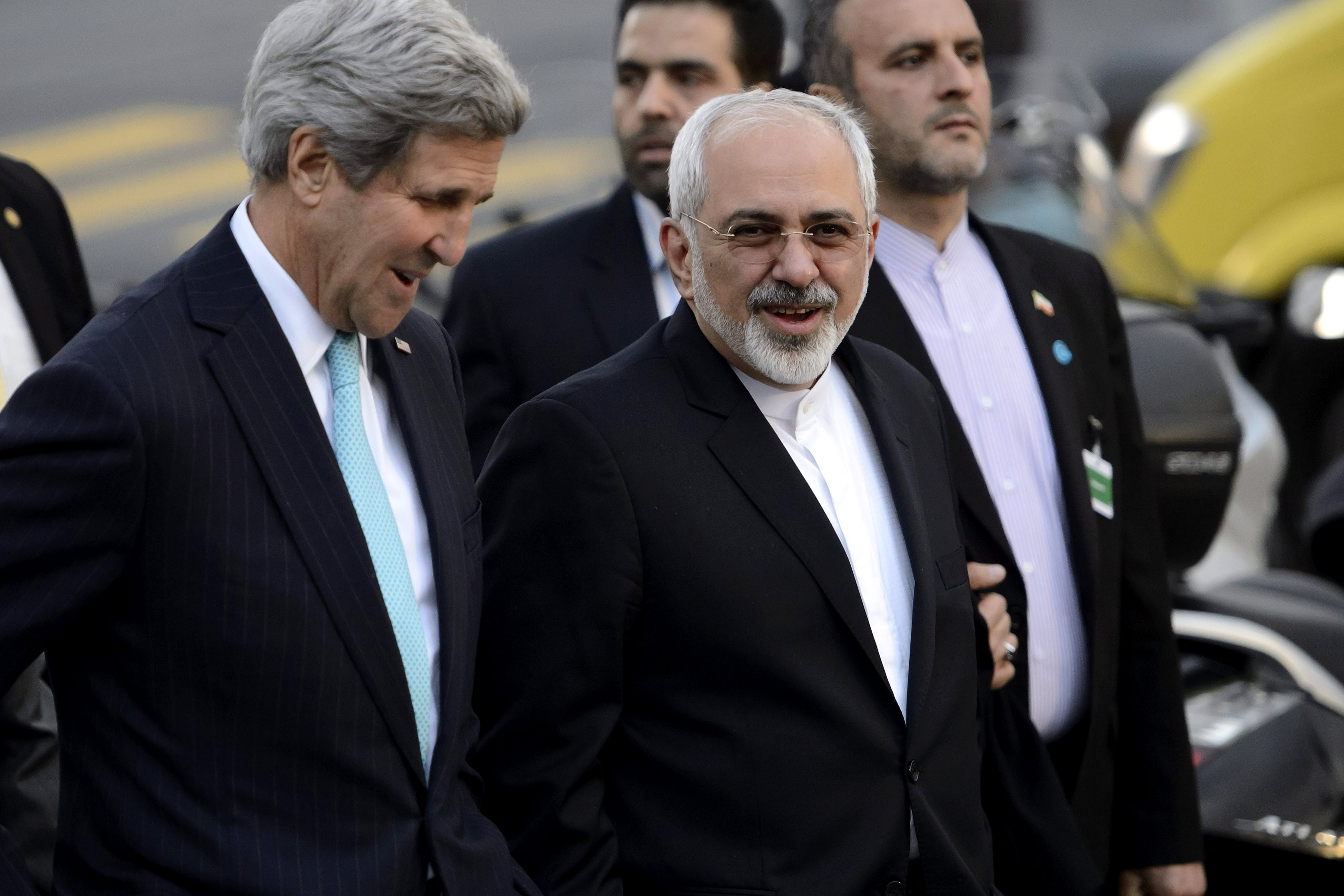Omni-minister Netanyahu left with no friends

In the January 2014 preliminary Geneva talks, the two foreign secretaries, Mohammed Javad Zarif and John Kerry created a more trusting relationship with each other than either Kerry or President Obama has been able to do with PM Netanyahu. Photo by AP.
Publicly backing Netanyahu on Iran, slamming him behind closed doors
Herzog, Livni and Lapid all toed the government’s line on Iran this week, joining the effort against the bad nuclear deal signed in Vienna; but behind closed doors, the opposition’s members did not spare their rod: ‘Netanyahu didn’t hold any cabinet meeting about Iran, even though we demanded it. He wanted all the credit, now he can bear the responsibility,’ Lapid says.
By Nechama Duek, Ynet news
July 17 2015
The Israeli leadership was not surprised by the announcement on the nuclear agreement signed between Iran and world powers. They have been ready for this moment for months now, even if the prime minister thought, until the very last moment, that there would be someone in Vienna to understand the magnitude of this screw up, of this danger.
Ahead of the signing, Israeli ministers received a list of talking points. Fairly childish and unimaginative. Not all ministers stuck to the instructions they received, even though they all repeated the mantra that this was a bad deal that endangers the State of Israel. Even several members of the opposition joined them.
On Tuesday evening, the prime minister convened the cabinet’s ministers for an urgent meeting, along with the professional ranks. Netanyahu, who was already wearing makeup from his appearances on different TV shows, appeared gloomy. He too could understand, according to those present at the meeting, that he lost this game, and that Israel may really be facing a new, complex reality. After briefing the ministers on the agreement, with the help of the professionals, the ministers discussed how to conduct the dialogue with the Americans.
“There was tension in the room,” one of the ministers said. “There were questions asked about tactics to use with the United States in general and particularly with Obama.”
Did you ask if he was going to try to recruit Congress as he has done before?
“He told us he will put up a fight for the sake of a fight, but he doesn’t expect to succeed.”
Everyone agreed that no further strain should be put on the already strained ties with the Americans, and an appropriate aid package was mentioned. The cabinet ministers, led by the prime minister, said in the meeting that Israel would not openly act in Congress and in the Senate in order to secure a majority against the agreement with Iran, as the risk is big and the chances are small, and leave that job to Jewish organizations and the Republicans.
“The work of the righteous, as you know, is done by others,” one of the ministers said cynically.
Political sources estimated that after the state budget is approved, and in light of the agreement between Iran and world powers, Netanyahu will try to bring the Zionist Union into the government.
“Sitting in the opposition is death,” a senior minister said. “Buji is tired of not being in on the secret, Shelly Yachimovich realizes she has to go through a seat at the government table to run against Herzog for the Labor chairmanship, and they’ll also be under public pressure to join the government.”
Herzog sounded less determined not to join the government this week.
“I agree with Netanyahu that this is a bad deal,” he says. “The agreement is problematic and it will set some dangerous forces free. But, as I told Netanyahu in the meeting, we need to put together a package, along with the US and the moderate countries in the region, so we could live here and create deterrence. I said this to the British Foreign Secretary as well, that in this case there’s no opposition and coalition. But we’re currently not talking about unity.”

Leaders of the Zionist Union in 2014. Livni has looked increasingly disinterested (sic, as though it’s nothing to do with her, as time goes by) while it is rumoured that Herzog is being courted to become foreign minister in Netanyahu’s shaky coalition. Photo by: Daniel Harush
With the emphasis being on ‘currently’?
“Currently we’re leading an opposition, and our party is not talking about joining. The political issue was not raised at all in my meeting with Bibi. He didn’t offer to join (the government) and I didn’t ask. I’m also not one of those who can’t understand that Israel’s situation is bad. If they turn to us, we’ll consider it. Right now we’re standing with the government in the fight against this bad deal, but it doesn’t mean we’re rushing to join the government. I also told Zehava Galon, who for her own reasons said I was going into a unity government in two weeks, that you could deal with security issues even from the opposition.”
Former justice and foreign minister Tzipi Livni ran from one TV studio to the next this week in an effort to bring Israel’s side to the world. She too set aside the word “opposition” and joined the fight against the deal with Iran, even though she made sure to mention that her party wasn’t joining a unity government.
“What Israel needs to do is go back to the diplomatic arena,” she says. “To initiate and recruit the US and world powers and figure out how they can help us in the new situation that has been created.”
Do you believe Obama who promised no harm will come to Israel and that it will maintain its security?
“In foreign relations, you don’t talk about belief, but about how to ensure that the promises will be translated into actions. For example, maintaining Israel’s military supremacy, declaring Hezbollah’s political branch as a terror organization, cooperating with Gulf states, ensuring a demilitarized security zone between us and Syria. We need to tell the Americans: ‘You said you’d take care of the nuclear program and you did, now take care of terrorism’.”
Was Netanyahu wrong in his conduct?
“Netanyahu’s concerns are genuine. A situation of a complete lack of trust was created between him and Obama. The world made a historic decision, which according to Netanyahu does not prevent the existential threat to Israel. In addition to that, Israel was not there to influence the process and the agreement. Now Iran received more legitimacy and Israel has less, and this is cause for concern.”
Yair Lapid, who up until recently was still a senior member of Netanyahu’s cabinet and part of the prime minister’s close circle of advisers, is also falling into line with Netanyahu’s positions on the nature of the agreement with Iran, but has something interesting to say about what the cabinet’s ministers knew about the nuclear negotiations. It turns out that ministers were not only not briefed about the two Israelis in Hamas captivity, they didn’t discuss the Iranian issue either.
“Bibi insisted on dealing with the Iranian issue on his own,” Lapid said. “In the two years I spent in the government, there were no cabinet meetings on this topic. We asked him – Lieberman, Bennett and I – why there were no strategic discussions about Iran. He promised to hold a meeting, and never did. In October 2014, I even wrote a letter to the head of the National Security Council, Yossi Cohen, in which I demanded to hold a cabinet meeting about the Iranian issue. But then the problems in the government started, and Netanyahu decided to go to elections.”
No cabinet meeting? Maybe he was worried about information leaking?
“No, he just wanted to get all the credit. Acted as if this was his kingdom. That’s why I’m telling him now, ‘bear the responsibility on your own, if you wanted all the credit.’ Even though, as an MK, I will stand with Israel and go to Washington and do whatever is needed to explain how bad this agreement is. Listen, as the finance minister I came to Bibi and said, ‘Take care of housing, of the social gaps.’ His answer was, ‘I have to take care of the Iranian issue.’
“Even with this main issue he failed and now he’s crying that they signed a bad agreement. Practically a robbed Cossack (someone complaining about robbery while he is the one who robs). But we have to say that this is a bad day for Jews, a dark day for the State of Israel. Iran continues being a terror state, but with international approval. Bibi didn’t mean to hurt Israel’s security but he failed and as a result, he hurt the security.”
